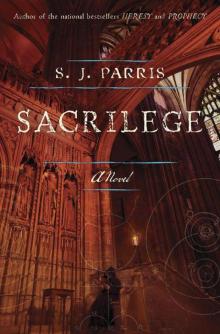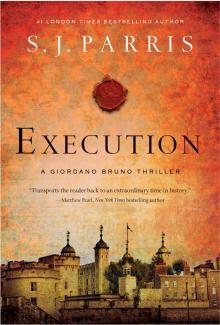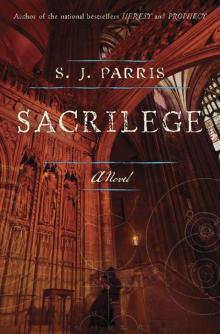- Home
- S. J. Parris
Treachery Page 3
Treachery Read online
Page 3
The sails billow and snap above us; the ship moves implacably forward, stately, unhurried. After a long silence, Sidney taps his pipe out on the rail in front of him.
‘I put a group of armed men and servants on the road to Plymouth two days ago. They will meet us there and escort Dom Antonio back to London.’
My earlier suspicions prickle again.
‘Along with us,’ I prompt.
Sidney turns to me with a triumphant smile, his eyes gleaming in the fading light. He grips my sleeve. ‘We are not going back to London, my friend. By the time Dom Antonio is warming his boots at Whitehall, you and I shall be halfway across the Atlantic.’
I stare at him for a long while, waiting – hoping – for some sign that this is another of his jokes. The wild light in his eyes suggests otherwise.
‘What, are we going to stow away? Hide among the baggage?’
‘I told you I had a plan for you, did I not?’ He leans back again, delighted with himself.
‘I thought it might be something realistic.’
‘Christ’s bones – don’t be such a naysayer, Bruno. Listen to me. What is the great problem that you and I share?’
‘The urge to write poetry, and a liking for difficult women.’
‘Other than those.’ He looks at me; I wait. ‘We lack independence, because we lack money.’
‘Ah. That.’
‘Exactly! And how do we solve it? We must be given money, or we must make it ourselves. And since I see no one inclined to give us any at present, what better way than to take it from the Spanish? To come home covered in glory, with a treasure of thousands in the hold – the look on her face then would be something to see, would it not?’
For a moment I think he means his wife, until I realise.
‘This is all to defy the Queen, then? For not sending you to the Low Countries? You plan to sail to the other side of the world without her permission?’
He does not answer immediately. Instead he looks out over the water, inhaling deeply.
‘Do you know how much Francis Drake brought home from his voyage around the world? No? Well, I shall tell you. Over half a million pounds of Spanish treasure. Ten thousand of that the Queen gave him for himself, more to be shared among his men. And that is only what he declared.’ He breaks off, shaking his head. ‘He has bought himself a manor house in Devon, a former abbey with all its land, and a coat of arms. The son of a yeoman farmer! And I cannot buy so much as a cottage for my family. My son will grow up knowing every mouthful he eats was provided by his grandfather, while his father sat by, dependent as a woman. How do you think that makes me feel?’
‘I understand you are frustrated, and angry with the Queen—’
‘The fellow she means to give the command of Flushing is my inferior in every degree. It is a public humiliation. I cannot walk through the galleries of Whitehall knowing the whole court is laughing at my expense. I am unmanned at every turn.’ The hand resting on the rail bunches into a fist.
‘So you must come home a conquering hero.’
‘What else is there for an Englishman to do but fight the Spanish?’ When he turns to me, I see he is white with anger. ‘It is no more than my duty, and she would prevent me for fear of letting her favourites out of her sight – she must keep us all clinging to her skirts, because she dreads to be alone. But I would be more than a pet to an ageing spinster, Bruno.’ He glances around quickly, to make sure this has not been overheard. ‘Picture it, will you – the thrill of bearding the King of Spain in his own territories, sailing back to England rich men. The Queen will not have gifts enough to express her thanks.’
I want to laugh, he is so earnest. Instead I rub the stubble on my chin, hand over my mouth, until I can speak with a straight face.
‘You really mean to do this? Sail with Drake to the Spanish Main? Does he even know?’
He shrugs, as if this were a minor detail. ‘I hinted at it numerous times as I was assisting him with the preparations this summer. I am not sure he took me seriously. But I can’t think he would object.’
‘He will, if he knows you travel without the Queen’s consent and against her wishes. He will not want to lose her favour.’ But I am not thinking of Drake’s advantage, only my own. The Queen will be livid with Sidney for flouting her command and if I am party to his enterprise, I will share her displeasure. Sidney will bounce back, because he is who he is, but my standing with her, such as it is, may never recover. And that is the best outcome; that is assuming we return at all.
‘Francis Drake would not be in a position to undertake this venture if it were not for me,’ Sidney says, his voice low and urgent. ‘Half the ships in his fleet and a good deal of the funds raised come from private investors I brought to him, gentlemen I persuaded to help finance the voyage.’ He jabs himself in the chest with his thumb to make the point. ‘He can hardly turn me away at the quayside.’
I shake my head and look away, over the waves. He is overstating his part in the venture, I am sure, but there is no reasoning with him when he is set on a course. If he will not brook objection from the Queen of England, he will certainly hear none from me.
‘I have no military experience, Philip, I am not a fighter. This is not for me.’
He snorts. ‘How can you even say so? I have seen you fight, Bruno, and take on men twice your size. For a philosopher, you can be very daunting.’ He flashes a sudden grin and I am relieved; I fear we are on the verge of a rift.
‘I can acquit myself in a tavern brawl, if I have to. That is not quite the same as boarding a ship or capturing a port. What use would I be at sea?’
‘What use are you in London now that the new Ambassador means to watch your every step, or kick you out altogether? You are no use to anyone at present, Bruno, not without patronage.’
I turn sharply away, keeping silent until I can trust myself to speak without betraying my anger. I can feel him simmering beside me, tapping the stem of the clay pipe hard against the wooden guardrail until it snaps and he throws it with a curse into the sea.
‘Thank you for reminding me of my place, Sir Philip,’ I say at length, in a voice that comes out tight and strangled.
‘Oh, for the love of Christ, Bruno! I meant only that you are of more use on this voyage than anywhere else, for now. Besides, he asked for you.’
‘Who did?’
‘Francis Drake. That’s why I invited you.’
I frown, suspicious.
‘Drake doesn’t know me. Why would he ask for me?’
‘Well, not by name. But this summer, in London, he asked me if I could find him a scholar to help him with something. He was very particular about it, though he would not explain why.’
‘But you are a scholar. Surely he knows that?’
‘I won’t do, apparently. He is looking for someone with a knowledge of ancient languages, ancient texts. A man of learning and discretion, he said, for a sensitive task. I told him I knew just the fellow.’ He beams, slinging an arm around my shoulder, all geniality again. ‘He told me to bring you to Plymouth when I came. Think, Bruno – I don’t know what he wants, but if you could do him some sort of service, it might smooth our way to a berth aboard his ship.’
I say nothing. When he invited me on this journey to Plymouth, he showered me with flattery: he could not dream of going without me, he said; he would miss my conversation; there was no one among his circle at court he would rather travel with, no one whose company he prized more highly. Now it transpires that he wants me as a sort of currency; something he can use to barter with Drake. Like a foolish girl, I have allowed myself to be sweet-talked into believing he wanted me for my own qualities. I also know that I am absurd to feel slighted, and this makes me all the more angry, with him and with myself. I shrug his arm off me.
‘Oh, come on, Bruno. I cannot think of going without you – what, left to the company of grizzled old sea dogs for months on end, with no conversation that isn’t of weevils and cordage and drinking the
ir own piss? You would not abandon me to such a fate.’ He drops to one knee, his hands pressed together in supplication.
Reluctantly, I crack a smile. ‘Weevils and drinking our own piss? Well then, you have sold it to me.’
‘See? I knew you would not be able to resist.’ He bounces back to his feet and brushes himself down.
Our friendship has always been marked by good-natured teasing, but his earlier words have stung; perhaps this is truly how he views me. Nothing without patronage.
‘Seriously, Philip,’ I turn to look him in the eye. ‘To risk the Queen’s displeasure so brazenly – are you really willing? I am not sure that I am.’
‘I swear to you, Bruno, by the time we come home, the sight of the riches we bring to her treasury will make her forget on the instant.’ When I do not reply, he leans in, dropping his voice to a whisper. ‘You do realise the money Walsingham pays you is not charity? He pays you for information. And if the Baron de Châteauneuf has as good as banished you, how can you continue to provide it?’
‘I will find a way. I always have before. Walsingham knows I will not let him down.’
‘Come, Bruno!’ He gives me a little shake, to jolly me along. ‘Do you not yearn to see the New World? What good is it to dream of worlds beyond the fixed stars if you dare not travel our own globe?’ He pushes a hand through his hair so that the front sticks up in tufts, a gesture he makes without knowing whenever he is agitated. ‘You’re thirty-seven years old. If you want nothing more from life than to sit in a room with a book, I can’t think why you ever left the cloister.’
‘Because I would have been sentenced to death by the Inquisition,’ I say, quietly. As he well knows. But how do you explain to a man like Sidney the reality of a life in exile? ‘And what of your wife and child?’ I add, as he stretches again and turns as if to leave.
He looks at me as if he does not understand the question. ‘What of them?’
‘Your first child is due in, what, three months? And you mean to be halfway across an ocean.’ With no good odds on returning, I do not say aloud. Even I know that Francis Drake’s famous circumnavigation returned to England with only one ship of six and a third of the men. But Sidney is as irrepressible as a boy when he sets his heart on something; he clearly believes there is no question but that we will return triumphant with armfuls of Spanish gold.
He frowns. ‘But I have done my part. She will have the child whether I am there or not, and there will be nursemaids to take care of it. God’s blood, Bruno, I have done what they asked of me, I have got an heir, that is why they have had me cooped up at Barn Elms for the past two years. Am I not permitted a little freedom now?’
I am tempted to observe that he has possibly misunderstood the nature of marriage, but I refrain; I am hardly qualified to advise him about women. Besides, there is no profit in making him more irritable. His anger, I see now, is not at me, but at everyone who would voice the same objections: his wife, his father-in-law, Francis Drake, the Queen. He is rehearsing his self-justification. I have great affection for Sidney, and he has many qualities I admire, but he can be spoilt and does not respond well to being thwarted.
‘It might be a girl,’ I reply.
He makes a noise of exasperation. ‘I am going back down for a drink. Are you coming?’
‘I think I will stay here for a while.’
‘As you wish.’ At the head of the stairs to the main deck he turns back, one hand on the guardrail. ‘You know, I am trying to find a way to help you, Bruno. I thought I might have a little more thanks than this.’ He sounds wounded. In my amazement at his mad scheme, it had not occurred to me that I might have hurt his feelings.
‘Forgive me. I am grateful for your efforts – do not think otherwise.’
‘You are coming, then? To the New World?’ His face brightens.
‘Let me get used to the idea.’
He disappears to the lower deck and I return my attention to the restless black water that surrounds us. Two weeks of this had seemed a diversion; months on end is another proposition entirely. In sunlight, the sea looked benign, obliging; now its vastness strikes me as overwhelming. To challenge it, to attempt to best it with such a small vessel, appears grotesquely presumptuous. But perhaps all acts of courage look like folly at first. The breeze lifts my hair from my face, and I realise that the sun has fully set and the horizon is no longer visible on either side. There is no divide between sea and sky, nothing but endless darkness and the indifferent stars.
TWO
We round the headland into Plymouth Sound two days later, early evening on 23rd August, as a cheer goes up from the men on deck. The wind has not been on our side since we passed the coast of Kent and moved into the English sea, making our progress slower than Knollys had predicted, but now the sky is clearer overhead, the sun glistening on a broad bay, surrounded on three sides by gently sloping cliffs, dark green with thick tree cover. Sidney and I have been standing at the prow for the past hour, craning for the first sight of the harbour, but nothing could have prepared me for the spectacle of the fleet anchored in the Sound.
Some thirty ships of varying sizes, the largest painted black and white and greater even than the Galleon Leicester, stand at anchor; between the great painted fighting ships and merchantmen, ten or so smaller pinnaces rock gently on the swell, sails furled, pennants snapping, their heraldic colours bright against the pale sky. The water sparkles and the whole has the appearance of a marvellous pageant. I find myself staring open-mouthed with delight like a child, Sidney likewise, as the crewmen on deck send up another cheer at the sight of their comrades. Until this moment, I would not have claimed any great interest in seafaring, but the assembled fleet is truly a sight to stir a sense of adventure. I picture all these ships sailing out in formation at Drake’s command, pointed towards the New World, Sidney and me at the prow, squinting into the sun towards an unknown horizon. And returning, to the salute of cannon from the Plymouth shore, our pockets bursting with Spanish gold. Sidney really believes this is possible; now that we are here, it is hard not to be infected by his conviction. All about us, a volley of shouted commands is unleashed, followed by the heavy slap of canvas as sails are furled, ropes heaved, chains let out with a great clanking of metal on metal, and the vast creaking bulk of the Galleon Leicester slows almost to a standstill as her anchors are dropped and rowboats lowered down her sides to the water. Knollys turns to us, eyes bright with pride, as if this show is all his doing.
‘There, gentlemen, you see the flagship, the Elizabeth Bonaventure, Sir Francis Drake’s own command. And there, the Tiger, captained by Master Carleill.’
He points across the Sound; Sidney shoots me a sideways look and a grimace. Half the investors in this expedition he knows from court, many of the officers men with connections to his own family. He will have to keep his plans quiet until the voyage is underway, for fear of Walsingham finding out.
Knollys continues, oblivious, his outstretched arm casting a long shadow over the deck as he gestures: ‘Across the way you have the Sea Dragon, the White Lion and the Galliot Duck, and there the little Speedwell, and beside her the Thomas Drake, named for the Captain-General’s brother and under his command.’
We are near enough to see the crews of the other ships, men scuttling up and down rigging and swarming over the decks like insects. Now that we are at ease in the shelter of the harbour, the breeze has dropped and I feel the warmth of the sun on my back for the first time since we left London.
‘And what is that island?’ I ask, pointing to a mound of rock in the middle of the Sound. Sheer cliffs rise to a wooded crest, and at the summit, a stone tower peeps above the treeline.
‘St Nicholas Island,’ Knollys says, shading his eyes, ‘though the locals call it Drake’s Island. Sir Francis has been trying to raise money to improve the fortifications in case of invasion. There was a garrison there in years past, though I believe it has fallen out of use for lack of funds. But come – the Captain-General, a
s we must call him on this voyage, will be expecting us.’
He leads us down a flight of stairs below deck, where he calls for rope ladders to be dropped over the side through a hatch. These are thin, precarious-looking contraptions, but Knollys swings himself easily into the gap and shins down to the two stout sailors holding the end of the ladder steady in the rowboat below. Sidney nudges me to follow, and a silent sailor hands me through the hatch, where I climb without looking down, gripping the ropes until my palms burn, placing one foot below the other, conscious all the while of Sidney’s impatient feet inches above my head.
The oarsmen negotiate a path between the anchored ships and from this vantage point, at the waterline, you understand the immensity of these galleons; their hulls the height of a church, their masts disappearing to a point so high you have to crane your neck until you are almost lying horizontal to see the top. Navigating through them you feel as if you are in a narrow lane between high buildings, if buildings were uprooted from their foundations and could lurch and heave at you. A hearty melody of flutes and viols carries across the water, accompanied by raucous singing that collapses into laughter after one verse. A few more strokes of the oars and our boat cracks against a sheer wooden cliff scaled with barnacles, where another ladder sways, awaiting us. I glance at my palms. Sidney notices and laughs.
‘Don’t expect to go home with the soft hands of a gentleman, Bruno.’
‘I’m not sure I have ever had the soft hands of a gentleman,’ I say. I hold them out and regard them on both sides, as if for evidence. My fingertips are stained with ink, as always.
‘That’s not what the ladies of the French court say,’ he replies, with a broad wink. It is one of Sidney’s favourite jokes: that I worked my way through the duchesses and courtesans of Paris before turning my keen eye to England. It amuses him that I was once a monk; he cannot imagine how I managed to keep to it all those years, the most vigorous years of my youth. He can only picture how he himself would have been, and so he likes to joke that, since leaving holy orders, I go about rutting everything in sight like a puppy on a chair leg. It amuses him all the more for being untrue.

 A Christmas Requiem
A Christmas Requiem Giordano Bruno 03 - Sacrilege
Giordano Bruno 03 - Sacrilege The Dead of Winter: Three gripping Tudor historical crime thriller novellas from a No. 1 Sunday Times bestselling fiction author
The Dead of Winter: Three gripping Tudor historical crime thriller novellas from a No. 1 Sunday Times bestselling fiction author Giordano Bruno 01 - Heresy
Giordano Bruno 01 - Heresy The Dead of Winter
The Dead of Winter Treachery (2019 Edition)
Treachery (2019 Edition) The Academy of Secrets
The Academy of Secrets Execution
Execution Sacrilege: A Novel
Sacrilege: A Novel Prophecy
Prophecy Sacrilege gb-3
Sacrilege gb-3 Prophecy (2011)
Prophecy (2011) Treachery
Treachery Prophecy gb-2
Prophecy gb-2 Heresy
Heresy